2022届高考英语二轮复习:非限制性定语从句-课件(20张)
文档属性
| 名称 | 2022届高考英语二轮复习:非限制性定语从句-课件(20张) | 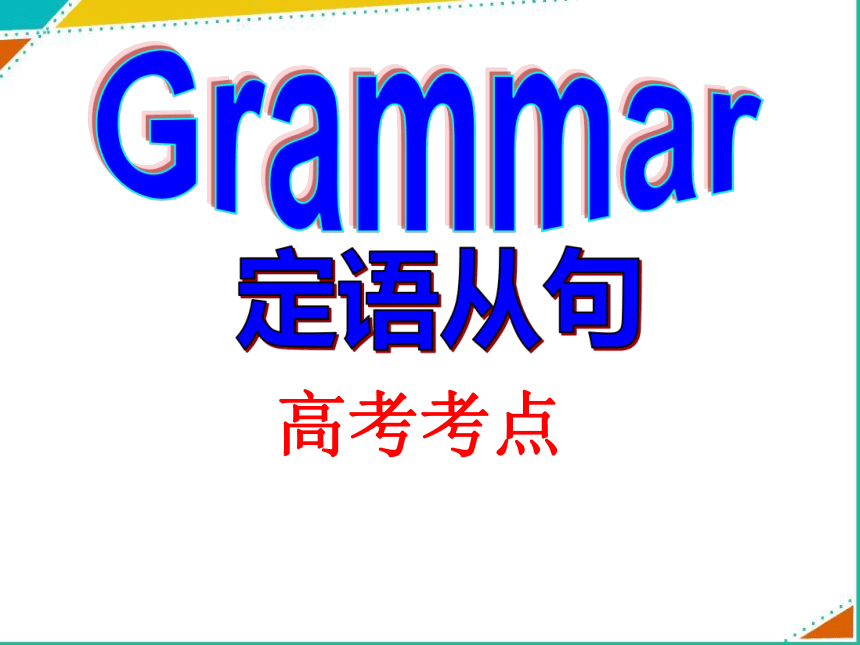 | |
| 格式 | pptx | ||
| 文件大小 | 667.8KB | ||
| 资源类型 | 教案 | ||
| 版本资源 | 通用版 | ||
| 科目 | 英语 | ||
| 更新时间 | 2022-01-02 10:17:33 | ||
图片预览

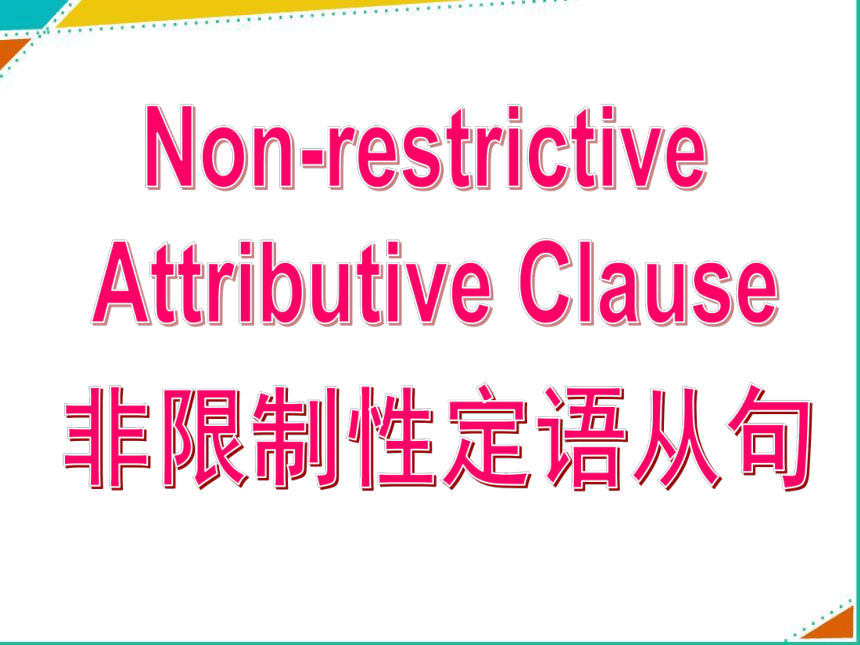
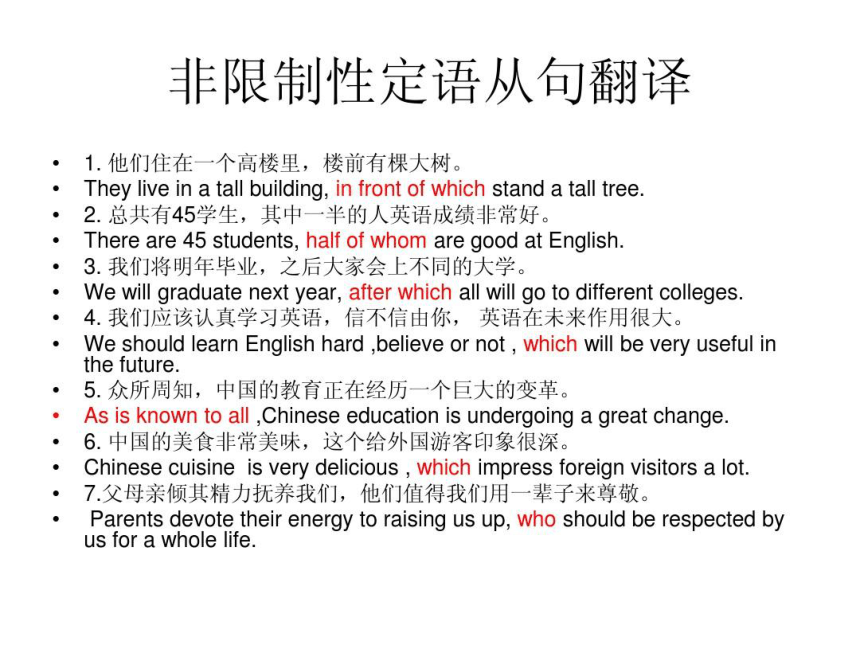
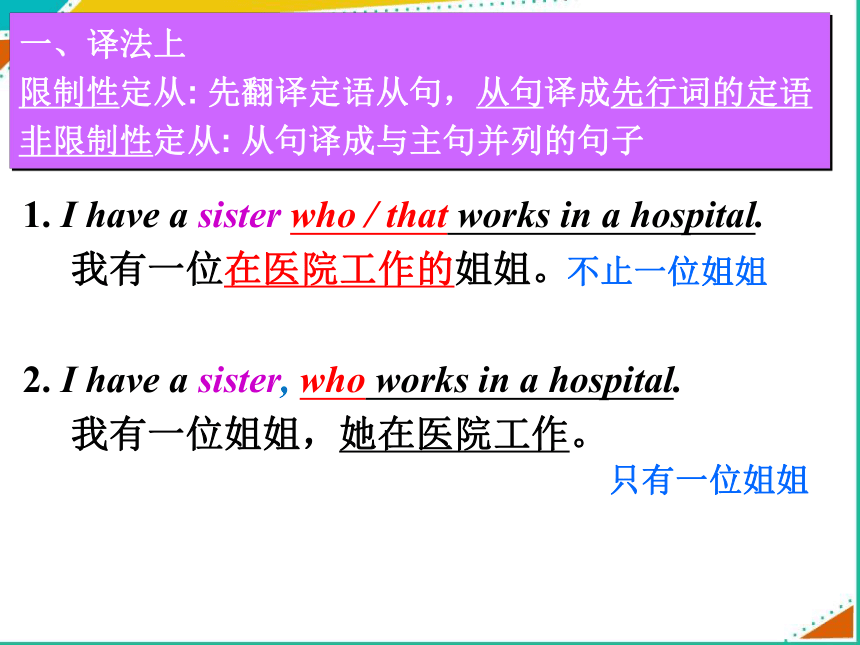
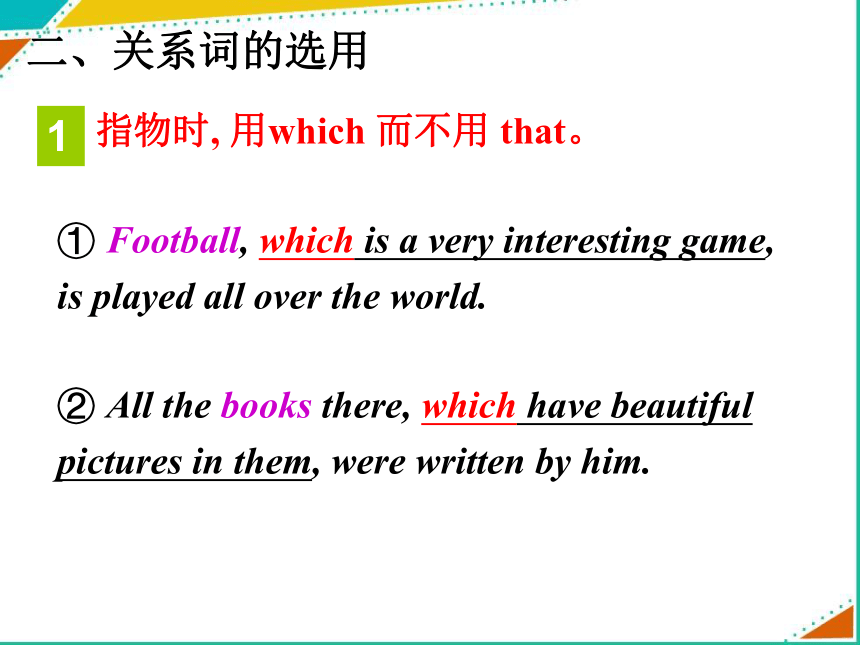
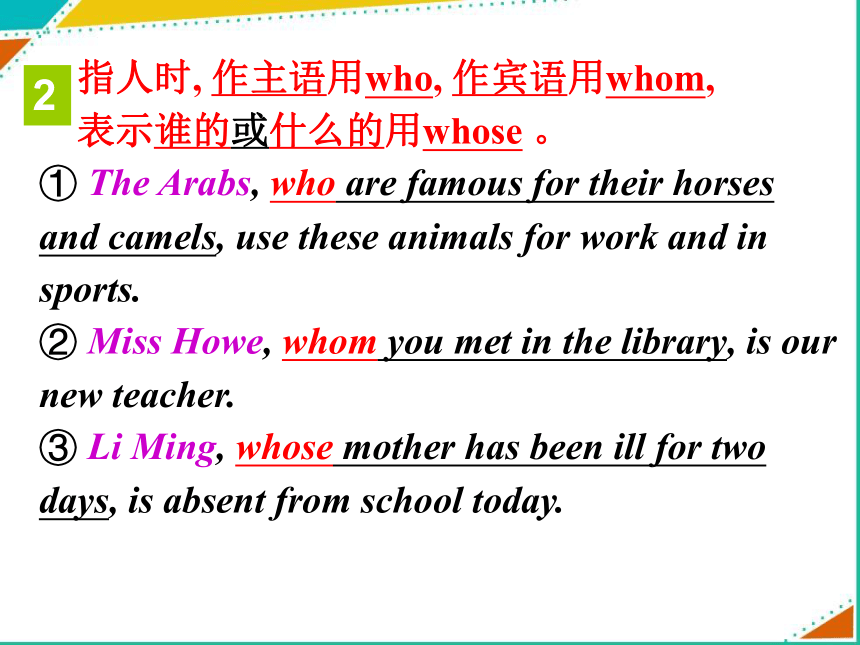
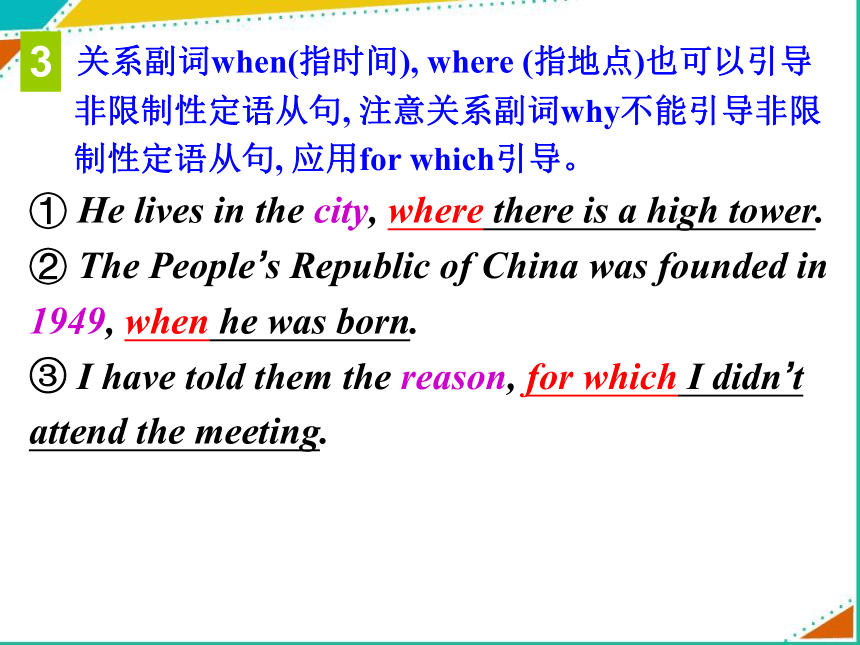
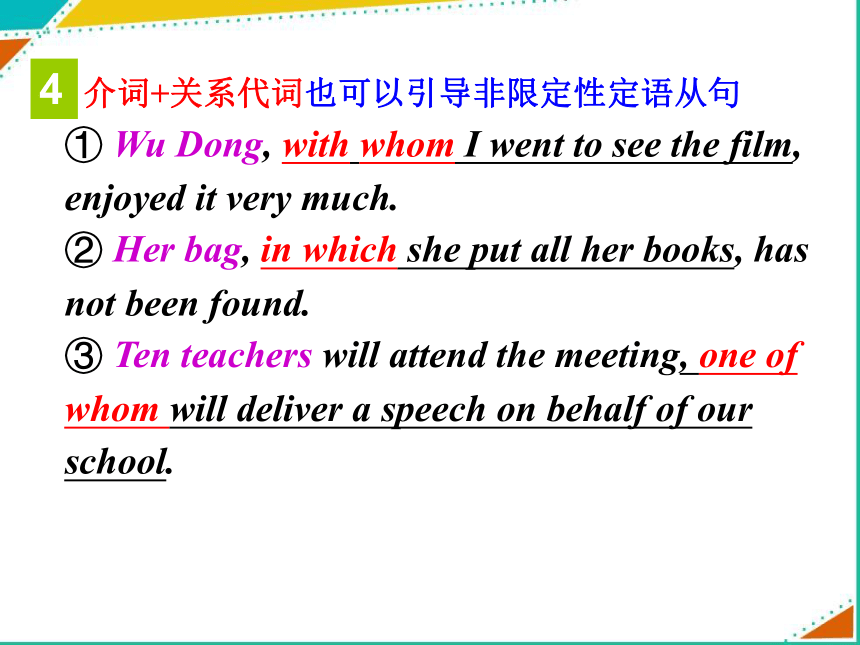
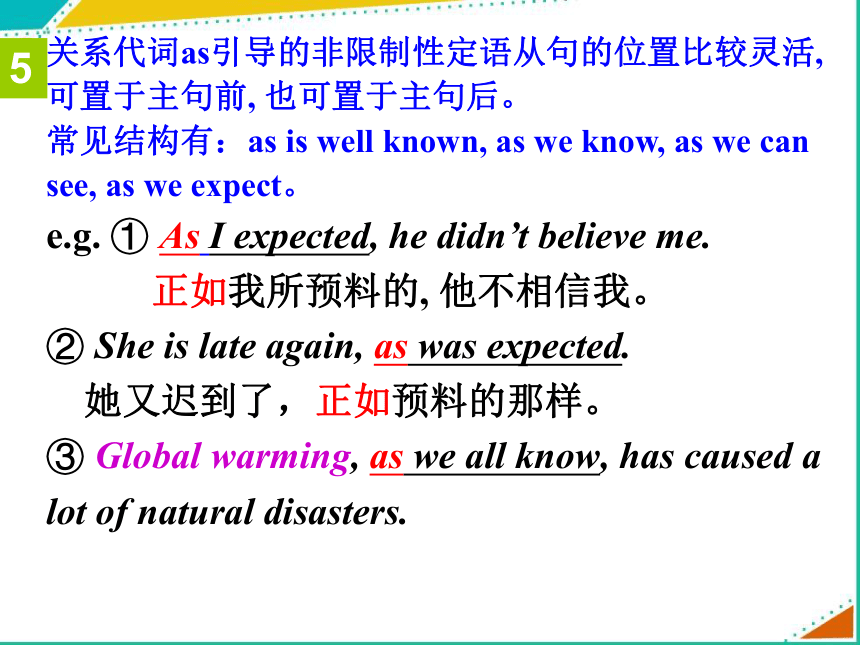
文档简介
(共20张PPT)
Grammar
定语从句
高考考点
非限制性定语从句
Non-restrictive
Attributive Clause
一、译法上
限制性定从: 先翻译定语从句,从句译成先行词的定语
非限制性定从: 从句译成与主句并列的句子
1. I have a sister who / that works in a hospital.
我有一位在医院工作的姐姐。
2. I have a sister, who works in a hospital.
我有一位姐姐,她在医院工作。
不止一位姐姐
只有一位姐姐
指物时, 用which 而不用 that。
① Football, which is a very interesting game, is played all over the world.
② All the books there, which have beautiful pictures in them, were written by him.
二、关系词的选用
1
指人时, 作主语用who, 作宾语用whom,
表示谁的或什么的用whose 。
① The Arabs, who are famous for their horses and camels, use these animals for work and in sports.
② Miss Howe, whom you met in the library, is our new teacher.
③ Li Ming, whose mother has been ill for two days, is absent from school today.
2
关系副词when(指时间), where (指地点)也可以引导非限制性定语从句, 注意关系副词why不能引导非限制性定语从句, 应用for which引导。
① He lives in the city, where there is a high tower.
② The People’s Republic of China was founded in 1949, when he was born.
③ I have told them the reason, for which I didn’t attend the meeting.
3
介词+关系代词也可以引导非限定性定语从句
① Wu Dong, with whom I went to see the film, enjoyed it very much.
② Her bag, in which she put all her books, has not been found.
③ Ten teachers will attend the meeting, one of whom will deliver a speech on behalf of our school.
4
关系代词as引导的非限制性定语从句的位置比较灵活, 可置于主句前, 也可置于主句后。
常见结构有:as is well known, as we know, as we can see, as we expect。
e.g. ① As I expected, he didn’t believe me.
正如我所预料的, 他不相信我。
② She is late again, as was expected.
她又迟到了,正如预料的那样。
③ Global warming, as we all know, has caused a lot of natural disasters.
5
练习
1.This letter is from his parents, _______ are working in
Beijing.
2. Mary’s father, _____ is a lawyer, is a strong man.
3. Yao Ming, _______ height is over 2 meters, won the honor in NBA with his hard work and skills.
4. I met Professor Wang this morning, with _______ I went to the same meeting.
5. Peter, ________ you met in London, is now back in Paris.
6. The boy, ________ father is an engineer, studies very hard.
who
who
whose
whom
whom
whose
练习
1. I study in an international school, _______ is a very
beautiful school.
2. We stopped at the only hotel in the village, _______ had
a front garden.
3. He doesn’t wear shoes, _______ makes him different
from others.
4. _____we know, smoking is harmful to our health.
5. _____ is reported, doctors have found the way of curing the disease.
6. I lived in this room, ________ door is red.
As
which
which
which
As
whose
练习题
1. They broke up last night, ______ it was raining heavily outside.
2. I met the famous professor in the hotel, _______ the meeting was held.
3. I paid a visit to a company last month, _________
my brother are working.
4. The meeting will be put off till next week, ______ those people will be back from Shanghai.
5. None of us accepted the reason he explained, ____________ he was absent.
when
where
where
when
for which
非限制性定语从句:既可修饰先行词, 又可修饰整个主句。
① Football, which is a very interesting game, is played all over the world.
② Miss Howe, whom you met in the library, is our new teacher.
③ The operation was not performed,
which may be the cause of her death.
手术没做, 这可能是她死亡的原因。
注意
限制性定从:关系代词作宾语时可省略
非限制性定从: 关系代词作宾语时不可省略
1. This is the house (which/ that) we bought last month.
这是我们上个月买的那幢房子。
2. The house, which we bought last month, is very nice.
这房子很漂亮, 是我们上个月买的。
3. They gave up the plan that/which they worked out yesterday.
4. They gave up the plan, which was a very good one.
限制性定从: 可用that 非限制性定从: 不可用that
注意4:非限制性定语从句和简单句的比较
1) He failed in the exam. _______ made his
parents angry.
2) He failed in the exam, _______ made his
parents angry.
3) He has two sons. Both of _______ are
teachers.
4) He has two sons, both of _______ are
teachers.
This
which
whom
them
× that
2. ① He has two sons, _____ are college students.
② He has two sons, and ____ are college students. A. both of which B. both of whom C. both of them D. both of it
B
C
1. Look at the girl _________ is singing so beautifully.
2. Do you know the woman to ______ our teacher is talking
3. Jim is the boy ______ hat is red.
4. He gave me a pen ___________ he bought last week.
5. Mary has read all the books ______ I lent her.
who/that
whom
whose
that / which
that
关系代词在定语从句中代替先行词作主语、宾语、表语或定语。
先行词作主宾表, 是人时用 _____, ______ 或 _____;
是物时用 ______ 或 ______。
先行词作定语, 表示“…… 的”时, 用 ______。
who whom that
which that
whose
6. Is it the reason _____ you were late
7. October 1st is the date _____ China celebrates its National Day.
8. We walked in a garden ______ many trees and flowers had been planted.
9. This is the island ______ I lived for two years.
10. 2001-2005 are the years _____ I studied in the university.
why
when
where
where
when
关系副词在定语从句中代替先行词作状语。先行词作原因状语时, 用_____;
作地点状语时, 用 _______;
作时间状语时, 用 ______。
why
where
when
11. He is the man __ _____ you can believe.
12. He gave me some books ____ ______ I
am not very familiar.
13. This is the reason ___ ______ he was late.
14. I will never go to the restaurant again
__ ______ I was treated badly.
15. 2008 is the year __ ______ the Olympic
Games were held in Beijing.
in whom
with which
for which
at which
in which
“介词 + 关系代词”引导定语从句时, 介词的选择要看与定语从句中_____, ______的搭配, 以及与______的搭配。
介词后的关系代词只能是_______或________。
先行词
动词
形容词
whom
which
限制性定语从句 非限制性定语从句
作用
功能
关系词
形式
修饰先行词
修饰先行词或整个句子
无逗号与主句分开
有逗号与主句分开
与主句语意关系紧凑,
修饰与限定先行词,
定语从句不能删除,若删除,主句的意思不完整。
与主句语意关系松散,对先行词或主句作附加说明,定语从句可以删除,删除后,主句意思仍然完整。
who,whom,whose,that, which, when, where,
why, 介词 + which / whom。关系代词作宾语可省略。
who, whom, whose, which, when, where,
介词 + which/whom。关系代词不可省略。
Grammar
定语从句
高考考点
非限制性定语从句
Non-restrictive
Attributive Clause
一、译法上
限制性定从: 先翻译定语从句,从句译成先行词的定语
非限制性定从: 从句译成与主句并列的句子
1. I have a sister who / that works in a hospital.
我有一位在医院工作的姐姐。
2. I have a sister, who works in a hospital.
我有一位姐姐,她在医院工作。
不止一位姐姐
只有一位姐姐
指物时, 用which 而不用 that。
① Football, which is a very interesting game, is played all over the world.
② All the books there, which have beautiful pictures in them, were written by him.
二、关系词的选用
1
指人时, 作主语用who, 作宾语用whom,
表示谁的或什么的用whose 。
① The Arabs, who are famous for their horses and camels, use these animals for work and in sports.
② Miss Howe, whom you met in the library, is our new teacher.
③ Li Ming, whose mother has been ill for two days, is absent from school today.
2
关系副词when(指时间), where (指地点)也可以引导非限制性定语从句, 注意关系副词why不能引导非限制性定语从句, 应用for which引导。
① He lives in the city, where there is a high tower.
② The People’s Republic of China was founded in 1949, when he was born.
③ I have told them the reason, for which I didn’t attend the meeting.
3
介词+关系代词也可以引导非限定性定语从句
① Wu Dong, with whom I went to see the film, enjoyed it very much.
② Her bag, in which she put all her books, has not been found.
③ Ten teachers will attend the meeting, one of whom will deliver a speech on behalf of our school.
4
关系代词as引导的非限制性定语从句的位置比较灵活, 可置于主句前, 也可置于主句后。
常见结构有:as is well known, as we know, as we can see, as we expect。
e.g. ① As I expected, he didn’t believe me.
正如我所预料的, 他不相信我。
② She is late again, as was expected.
她又迟到了,正如预料的那样。
③ Global warming, as we all know, has caused a lot of natural disasters.
5
练习
1.This letter is from his parents, _______ are working in
Beijing.
2. Mary’s father, _____ is a lawyer, is a strong man.
3. Yao Ming, _______ height is over 2 meters, won the honor in NBA with his hard work and skills.
4. I met Professor Wang this morning, with _______ I went to the same meeting.
5. Peter, ________ you met in London, is now back in Paris.
6. The boy, ________ father is an engineer, studies very hard.
who
who
whose
whom
whom
whose
练习
1. I study in an international school, _______ is a very
beautiful school.
2. We stopped at the only hotel in the village, _______ had
a front garden.
3. He doesn’t wear shoes, _______ makes him different
from others.
4. _____we know, smoking is harmful to our health.
5. _____ is reported, doctors have found the way of curing the disease.
6. I lived in this room, ________ door is red.
As
which
which
which
As
whose
练习题
1. They broke up last night, ______ it was raining heavily outside.
2. I met the famous professor in the hotel, _______ the meeting was held.
3. I paid a visit to a company last month, _________
my brother are working.
4. The meeting will be put off till next week, ______ those people will be back from Shanghai.
5. None of us accepted the reason he explained, ____________ he was absent.
when
where
where
when
for which
非限制性定语从句:既可修饰先行词, 又可修饰整个主句。
① Football, which is a very interesting game, is played all over the world.
② Miss Howe, whom you met in the library, is our new teacher.
③ The operation was not performed,
which may be the cause of her death.
手术没做, 这可能是她死亡的原因。
注意
限制性定从:关系代词作宾语时可省略
非限制性定从: 关系代词作宾语时不可省略
1. This is the house (which/ that) we bought last month.
这是我们上个月买的那幢房子。
2. The house, which we bought last month, is very nice.
这房子很漂亮, 是我们上个月买的。
3. They gave up the plan that/which they worked out yesterday.
4. They gave up the plan, which was a very good one.
限制性定从: 可用that 非限制性定从: 不可用that
注意4:非限制性定语从句和简单句的比较
1) He failed in the exam. _______ made his
parents angry.
2) He failed in the exam, _______ made his
parents angry.
3) He has two sons. Both of _______ are
teachers.
4) He has two sons, both of _______ are
teachers.
This
which
whom
them
× that
2. ① He has two sons, _____ are college students.
② He has two sons, and ____ are college students. A. both of which B. both of whom C. both of them D. both of it
B
C
1. Look at the girl _________ is singing so beautifully.
2. Do you know the woman to ______ our teacher is talking
3. Jim is the boy ______ hat is red.
4. He gave me a pen ___________ he bought last week.
5. Mary has read all the books ______ I lent her.
who/that
whom
whose
that / which
that
关系代词在定语从句中代替先行词作主语、宾语、表语或定语。
先行词作主宾表, 是人时用 _____, ______ 或 _____;
是物时用 ______ 或 ______。
先行词作定语, 表示“…… 的”时, 用 ______。
who whom that
which that
whose
6. Is it the reason _____ you were late
7. October 1st is the date _____ China celebrates its National Day.
8. We walked in a garden ______ many trees and flowers had been planted.
9. This is the island ______ I lived for two years.
10. 2001-2005 are the years _____ I studied in the university.
why
when
where
where
when
关系副词在定语从句中代替先行词作状语。先行词作原因状语时, 用_____;
作地点状语时, 用 _______;
作时间状语时, 用 ______。
why
where
when
11. He is the man __ _____ you can believe.
12. He gave me some books ____ ______ I
am not very familiar.
13. This is the reason ___ ______ he was late.
14. I will never go to the restaurant again
__ ______ I was treated badly.
15. 2008 is the year __ ______ the Olympic
Games were held in Beijing.
in whom
with which
for which
at which
in which
“介词 + 关系代词”引导定语从句时, 介词的选择要看与定语从句中_____, ______的搭配, 以及与______的搭配。
介词后的关系代词只能是_______或________。
先行词
动词
形容词
whom
which
限制性定语从句 非限制性定语从句
作用
功能
关系词
形式
修饰先行词
修饰先行词或整个句子
无逗号与主句分开
有逗号与主句分开
与主句语意关系紧凑,
修饰与限定先行词,
定语从句不能删除,若删除,主句的意思不完整。
与主句语意关系松散,对先行词或主句作附加说明,定语从句可以删除,删除后,主句意思仍然完整。
who,whom,whose,that, which, when, where,
why, 介词 + which / whom。关系代词作宾语可省略。
who, whom, whose, which, when, where,
介词 + which/whom。关系代词不可省略。
